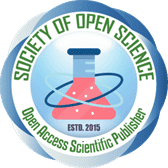Triterpenoids of Nerium oleander shows Antifertility effect in Male Albino Rats
Keywords:
Nerium oleander, Methanolic extract, Triterpenoids, AntifertilityAbstract
Antifertility activity of methanolic extract of the stem of Nerium oleander was carried out on male albino rat. After the careful experiments, the results revealed that oral administration of methanolic extract of the stem of Nerium oleander affected male fertility by two means, antispermatogenic and antiandrogenic action. It might be due to the presence of some triterpenoids compounds. So it could be a scope of developing an ideal male contraceptive, due to its antispermatogenic effects.
Downloads
References
Ma, W.K. & Ramaswamy, S.B. (1987). Histological changes during ovarian maturation in the tarnished plant bug, Lygus lineolaris (Palisot de beauvois) (Hemiptera: Miridae). Int. J. Insect Morphol. Embryol., 16(5): 309–322. https://doi.org/10.1016/0020-7322(87)90003-1.
Kamal, R., Gupta, R.S. & Lohiya, N.K. (2003). Plants for male fertility regulation. Phytother. Res., 17(6): 579–590. https://doi.org/10.1002/ptr.1320.
Hussain, M.A. & Gorsi, M.S. (2004). Antimicrobial Activity of Nerium oleander Linn. Asian J. Plant Sci., 3: 177-180. https://doi.org/10.3923/ajps.2004.177.180.
Zhao, M., Zhang, S., Fu, L., Li, N., Bai, J., Sakai, J., Wang, L., Tang, W., Hasegawa, T., Ogura, H., Kataoka, T., Oka, S., Kiuch, M., Hirose, K. & Ando, M. (2006). Taraxasterane- and ursane-type triterpenes from Nerium oleander and their biological activities. J. Nat. Prod., 69(8): 1164–1167. https://doi.org/10.1021/np0680073.
Siddiqui, S., Hafeez, F., Begum, S. & Siddiqui, B.S. (1988). Oleanderol, a New Pentacyclic Triterpene from the Leaves of Nerium oleander. J. Nat. Prod., 51(2): 229–233. https://doi.org/10.1021/np50056a006.
Kang, S.S. (1987). 13C-NMR spectroscopy of amyrins. Korean J. Pharmacogn., 18: 151–167.
Siddiqui, B.S., Sultana, R., Begum, S., Zia, A. & Suria, A. (1997). Cardenolides from the Methanolic Extract of Nerium oleander Leaves Possessing Central Nervous System Depressant Activity in Mice. J. Nat. Prod., 60(6): 540–544. https://doi.org/10.1021/np960679d.
Ding, K., Fang, J.N., Dong, T., Tsim, K.W. & Wu, H. (2003). Characterization of a Rhamnogalacturonan and a Xyloglucan from Nerium indicum and their Activities on PC12 Pheochromocytoma Cells. J. Nat. Prod., 66(1): 7–10. https://doi.org/10.1021/np020118o.
Jeong, S.E., Lee, Y., Hwang, J.H. & Knipple, D.C. (2001). Effects of the sap of the common oleander Nerium indicum (Apocyanaceae) on male fertility and spermatogenesis in the oriental tobacco budworm Helicoverpa assulta (Lepidoptera, Noctuidae). J. Exp. Biol., 204: 3935–3942.
CPCSEA (2006). Committee for the Purpose of Control and Supervision of Experiments on Animals, Ministry of Fisheries, Animal Husbandry and Dairying, Government of India, New Delhi.
WHO (1983a). Protocol CG-04: Preparation of alcoholic extract for bioassay and phytochemical studies (APJF/IP, 1001A). World Health Organization, Geneva.
WHO (1983). Protocol MB-50: A method for examining the effect of the plant extracts administration orally on the fertility of male rats (APF/IP, 9914E). World Health Organization, Geneva.
Lowry, O.H., Rosebrough, N.J., Farr, A.L. & Randall, R.J. (1951). Protein measurement with the Folin phenol reagent. J. Biol. Chem., 193(1): 265–275. https://doi.org/10.1016/S0021-9258(19)52451-6.
Zlatkis, A., Zak, B. & Boyle, A.J. (1953). A new method for the direct determination of serum cholesterol. J. Lab. Clin. Med., 41(3): 486–492. https://doi.org/10.5555/uri:pii:0022214353901255.
Zilversmit, D.B., Davis, A.K., Memphis, B.S. & Tenn, N. (1950). Estimation of phospholipids in biological fluids. J. Lab. Clin. Med., 35: 155-60.
Fiske, C.H. & Subbarow, Y. (1925). A colorimetric determination of phosphorus. J. Biol. Chem., 66: 375–400.
Cabaud, P.G. & Wroblewski, F. (1958). Colorimetric measurement of lactic dehydrogenase activity of body fluids. Am. J. Clin. Pathol., 30(3): 234–236. https://doi.org/10.1093/ajcp/30.3.234.
WHO (1999). Annual Technical Report 1998, Special programme of research, development and research training in human reproduction. World Health Organization, Geneva. pp. 111.
Varley, H. (1969). Practical clinical biochemistry. 4th ed., William Heinemann (Medical Books) Ltd and Interscience Books Inc, London, pp. 200-275.
Asatoor, A.M. & King, E.J. (1954). Simplified colorimetric blood sugar method. Biochem. J., 56: 44.
Lynch, M.J., Raphael, S.S., Mellor, L.D., Spare, P.D. & Inwood, M.J.H. (1969). Medical laboratory technology and clinical pathology. 2nd ed., W.B. Saunders, Philadelphia.
Abercrombie, M. (1946). Estimation of nuclear population from microtome sections. Anat. Rec., 94: 239–247. https://doi.org/10.1002/ar.1090940210.
Gupta, S. (1978). Sampling and test of significance. In: Gupta, S. (Ed.), Statistical Methods. Sultan Chand and Sons Publishers, New Delhi, pp. 58–76.
Downloads
Published
How to Cite
Issue
Section
License
Copyright (c) 2019 The author(s) retains the copyright of this article.

This work is licensed under a Creative Commons Attribution 4.0 International License.
This is an open access article distributed under the Creative Commons Attribution License which permits unrestricted use, distribution, and reproduction in any medium, provided the original work is properly cited.





